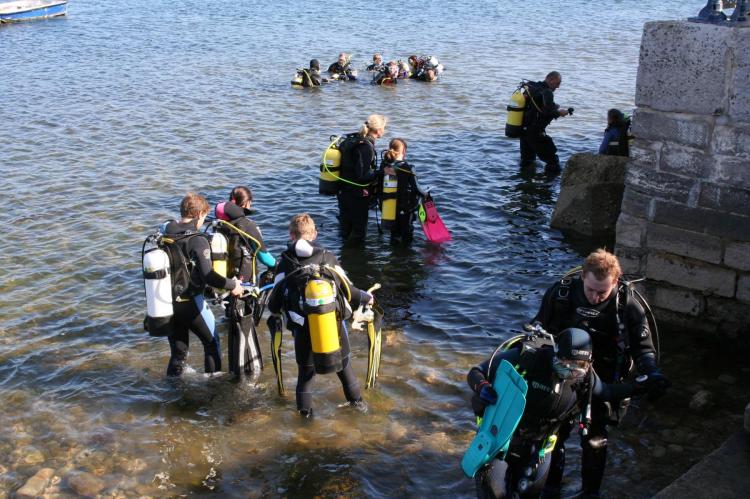“Be Cautious, Be Safe” states the BDSG, as new Government Restrictions commence
The British Diving Safety Group COVID-19 team met virtually yesterday (Wednesday 4th November 2020) to discuss the new government restrictions that commenced at midnight last night.
BDSG Guidance for diving in England
These guidelines are subject to change, so please refer to the government website for the latest guidance.
• Stay at home, except for specific purposes
• Avoid meeting people you do not live with, except for specific purposes
• Close certain businesses and venues
These new measures will reduce the growth rate of the virus, which will:
• Prevent the NHS from being overwhelmed
• Ensure schools, colleges and universities can stay open
• Ensure that as many people as possible can continue to work
A spokesman for the BDSG confirmed “The Government Guidelines state ‘you may spend time or exercise outdoors – this should be done locally where possible, but you can travel to do so if necessary.’ This could include travelling to a public beach, where it may be possible to shore dive with one other person.
If you are going to dive, be cautious, be safe – make a responsible decision and consider the implications of your actions. BDSG
It will be very difficult to carry out training under the current guidelines, but it is not explicitly banned. Anyone carrying out commercial training will need to ensure they comply, as normal, with the HSE Diving at Work regulations. They must also comply with the COVID-19 guidance as well.
If you are going to dive, be cautious, be safe – make a responsible decision and consider the implications of your actions.”
The BDSG cannot provide tailored advice that covers everyone's individual diving plans
Gareth Morrison, RNLI Head of Water Safety stated “No one heads to the coast or out on the water with the mindset of needing to be rescued, yet we undertake thousands of rescues each year.
Our volunteer lifeboat crews have continued to operate throughout the pandemic and remain on call 24/7 to respond to emergencies. But anyone going on or in the water must understand the risks and take the necessary steps to keep themselves as safe as possible. During the pandemic, we must all take reasonable precautions to reduce the demands on RNLI and independent lifeboat crews, HM Coastguard, and other emergency services. In an emergency though, please call 999 and ask for the Coastguard.”
The BDSG is unable to provide tailored advice that covers everyone's individual diving plans.
Fact File
The British Diving Safety Group (BDSG) was formed in 2002 to promote safe diving practices amongst the British sport diving community. It is chaired by the RNLI.
The group has broad representation, with all of the UK diver training agencies, the HSE and the MCA having a seat at the table. These organisations regularly meet in order to work towards a common goal; to make diving safer. By sharing and analysing incident data, devising safety initiatives and then promoting them to divers, the group has a broad influence on the recreational diving community. The comprehensive nature of the BDSG, reflecting as it does all of the significant interests in the British sport diving scene means that it is uniquely positioned to significantly influence diving safety.
BDSG Members
The members are
- BHA (British Hyperbaric Association)
- BSAC (British Sub Aqua Club)
- DAN Europe (Divers Alert Network)
- DDRC Healthcare (Diving Diseases Research Centre)
- DDST (Defence Diving Standards Team)
- Diving Ireland (Irish Underwater Federation)
- GADAP (Global Association of Diving Assistance Providers)
- GUE (Global Underwater Explorers)
- HSE Diving Inspectorate (Health & Safety)
- IANTD (International Association of Nitrox and Technical Divers)
- IDEST (Inspectorate for Diving Equipment, Servicing and Testing)
- MCA (Maritime and Coastguard Agency)
- PADI (Professional Association of Diving Instructors)
- PBA (Professional Boatman’s Association)
- PSAI Europe (Professional Scuba Association International)
- RAID UK & Malta (Rebreather Association of International Divers)
- RNLI (Royal National Lifeboat Institute)
- SAA (Sub Aqua Association)
- ScotSac (Scottish Sub Aqua Club)
- SITA (Scuba Industries Trade Association)
- SSI (Scuba Schools International)
- TDI SDI (Technical Diving International / Scuba Diving International)
- UK DMC (Diving Medical Committee)
- UK IDS (UK Inland Dive Sites)


